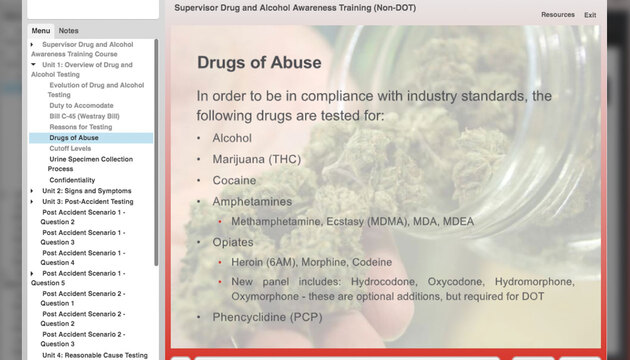
How to Become a Drug And Alcohol Awareness Trainer: Expert Guide
Are you passionate about helping others make informed choices? Becoming a drug and alcohol awareness trainer might be your perfect path.
Imagine having the skills to educate individuals and communities, empowering them with knowledge that could potentially save lives. This role is not just about teaching; it’s about making a real difference. You don’t need to be an expert to start.
With the right guidance and tools, you can transform your passion into a fulfilling career. You’ll discover step-by-step how you can become a certified trainer, gain essential skills, and find the best resources to kickstart your journey. Let’s dive into how you can make a meaningful impact in your community and beyond.
Role Of A Drug And Alcohol Awareness Trainer
Guiding individuals on substance effects, a Drug and Alcohol Awareness Trainer educates communities. This role involves creating engaging workshops, ensuring participants understand risks and prevention strategies. Training requires strong communication skills and a commitment to promoting healthier choices through informative sessions.
Becoming a Drug and Alcohol Awareness Trainer is a fulfilling journey that can make a real difference in your community. As a trainer, you play a crucial role in educating individuals and groups about the risks and effects of substance abuse. Your work can help prevent addiction and support those seeking a healthier lifestyle. But what does this role entail, and how can you effectively make an impact?
Understanding The Responsibilities
Your primary responsibility is to educate. You are the bridge between complex information and the people who need to understand it. This means breaking down facts into digestible, relatable content. You might conduct workshops, lead group discussions, or provide one-on-one guidance. The format can vary, but your goal is always the same: to raise awareness and promote safe choices.
Developing Engaging Content
Creating engaging content is essential. Think about your audience—what will resonate with them? Use real-world scenarios to illustrate points. Share stories that highlight the impact of substance abuse and the benefits of sobriety. Remember, your content should inspire action, not just impart knowledge.
Building Empathy And Trust
Successful trainers connect with their audience on a personal level. Share your experiences, if you have any, or stories of others who have overcome challenges. When you speak from the heart, you build trust. People are more likely to listen and engage when they feel understood and supported.
Staying Informed
The world of drug and alcohol awareness is ever-changing. New substances, trends, and research emerge regularly. Stay informed by attending workshops, reading up-to-date studies, and networking with other professionals. Knowledge is your tool—it empowers you to provide the most accurate and effective training.
Encouraging Interaction
Make your sessions interactive. Ask questions that provoke thought and discussion. Encourage participants to share their views and experiences. This not only keeps the session lively but also helps participants learn from each other.
Assessing The Impact
How do you know if your training is effective? Gather feedback from your participants. Use surveys or informal discussions to understand what worked and what didn’t. This feedback will help you refine your approach and improve future sessions. As a Drug and Alcohol Awareness Trainer, your role is pivotal. You have the power to educate, inspire, and change lives. What steps will you take today to enhance your training skills? Your journey as a trainer is just beginning.
Essential Skills And Qualities
Becoming a drug and alcohol awareness trainer requires strong communication skills and empathy. Understanding addiction and staying updated on current trends is crucial. The ability to engage and educate diverse audiences enhances the effectiveness of training sessions.
Becoming a drug and alcohol awareness trainer is not just about having knowledge; it’s about cultivating the right skills and qualities to make a meaningful impact. Imagine being the person who can change someone’s path with your words and actions. To be effective, you need more than facts; you need the ability to communicate, empathize, and educate. Let’s explore the essential skills and qualities that will set you on the right track.
Communication Skills
Clear communication is your most powerful tool. You must convey complex information in a way that is easy to understand. Consider your audience: Are they young students, professionals, or individuals seeking help? Adapt your message to fit their needs. Active listening is equally important. It shows respect and helps you tailor your responses. If someone shares a personal story, really listen. Your engagement can make them feel valued and more open to learning.
Empathy And Understanding
Empathy is more than just feeling sorry for someone. It’s about understanding their experiences and perspectives. Imagine a person struggling with addiction—how would you feel if you were in their shoes? This understanding can guide your approach and make your training sessions more impactful. People respond better when they feel understood. Share your own stories if they can help others feel less alone. Your vulnerability can build trust and encourage open dialogue.
Educational Techniques
Effective trainers use a mix of educational techniques to keep learners engaged. Think about the best teachers you’ve had—what made their lessons stick? Incorporate interactive activities that make learning fun and memorable. Visual aids, like charts and videos, can help explain difficult concepts. Encourage discussions to allow participants to share their thoughts and experiences. This not only enhances learning but also builds a community of support among participants. What skills do you think you need to develop further? Reflect on your strengths and areas for improvement. By honing these essential skills and qualities, you’ll be better equipped to make a difference in the lives of others.
Educational Requirements
Understanding the educational requirements is crucial for those pursuing a career in Drug and Alcohol Awareness Training. This path involves specialized knowledge and skills. The journey begins with acquiring the necessary academic credentials. Each step builds your expertise, preparing you to educate others on substance abuse prevention.
Relevant Degrees
A degree in psychology provides a solid foundation. It helps understand addiction behavior. Social work degrees focus on community health. These degrees address the societal aspects of substance abuse. Public health studies emphasize prevention strategies. They teach methods to reduce harm in communities. Each degree offers unique insights into drug and alcohol issues.
Certification Programs
Certification programs validate your expertise. They ensure you meet industry standards. Programs like Certified Alcohol and Drug Counselor (CADC) are popular. They cover essential topics, including counseling techniques. They also focus on ethical practices. Attending these programs boosts credibility. It demonstrates commitment to professional growth.
Continuing Education
Continuing education is vital in this field. It keeps you updated on new research. Workshops offer interactive learning experiences. They often cover emerging trends in addiction treatment. Online courses provide flexibility. They allow learning at your own pace. Staying informed ensures effective teaching methods.

Certification And Licensing
Embarking on the journey to become a certified drug and alcohol awareness trainer is a fulfilling endeavor. Certification and licensing play a crucial role in ensuring that you are equipped with the necessary skills and knowledge to make a positive impact. This process involves understanding national certification options, meeting state licensing requirements, and engaging in renewal and continuing education.
National Certification Options
National certification is your first step in becoming a recognized trainer. These certifications validate your expertise and commitment to the field. For example, the Substance Abuse Certification Board offers programs that cover essential topics such as intervention strategies and prevention techniques.
Consider how certification might open doors for you. Will it enhance your credibility or help you reach a broader audience? The right certification can be a powerful tool in your professional toolkit.
State Licensing Requirements
State licensing is another important aspect to consider. Each state has its own requirements, which can include specific coursework or examinations. It’s essential to research what your state mandates to ensure compliance.
Imagine the peace of mind that comes with knowing you’re fully licensed to train others. State requirements may seem daunting, but they are designed to ensure quality training for all participants.
Renewal And Continuing Education
Certification and licensing are not a one-time event. They require renewal and continuous education. This ongoing process keeps you updated with the latest trends and information in the field.
Are you prepared for this commitment? Engaging in continuing education not only meets requirements but also enriches your teaching approach. It’s a chance to learn, grow, and improve your effectiveness as a trainer.
As you navigate these steps, consider how they contribute to your overall mission of promoting health and awareness. Each certification, license, and renewal is a step toward making a lasting impact in your community.
Gaining Experience
Gaining experience is crucial in drug and alcohol awareness training. It enhances your skills and builds confidence. Practical exposure solidifies theoretical knowledge. Let’s explore three key ways to gain experience in this field.
Internships And Volunteering
Internships offer valuable hands-on experience. They allow you to work alongside experienced professionals. You’ll learn the daily operations of drug and alcohol programs. Volunteering also provides a platform to engage with communities. You can assist in awareness campaigns and workshops. This involvement helps you understand real-world challenges and solutions.
Workshops And Seminars
Workshops provide intensive learning experiences. They focus on specific aspects of substance awareness. Attending these events keeps you updated with the latest practices. Seminars offer networking opportunities with industry experts. They often include discussions on emerging trends and strategies. Engaging in these events enhances your knowledge and skill set.
Networking Opportunities
Networking is essential in this field. It connects you with professionals and mentors. Attend industry conferences and meetups. These events offer the chance to exchange ideas and experiences. Joining relevant online forums and groups is also beneficial. Building a strong network opens doors to further opportunities and collaborations.
Developing Training Programs
Developing effective training programs for drug and alcohol awareness is crucial. These programs educate and empower individuals to make informed choices. A well-structured program can reduce substance misuse and its impact. It involves designing a curriculum, incorporating real-life scenarios, and using technology.
Curriculum Design
The curriculum is the backbone of any training program. It should cover essential topics like substance effects, legal consequences, and support resources. Each module needs to be clear and concise. Engaging content keeps learners interested. Use a mix of text, visuals, and interactive elements. This ensures a comprehensive understanding. Regular updates keep the curriculum relevant.
Incorporating Real-life Scenarios
Real-life scenarios make training relatable and impactful. They help learners connect theory with practice. Use case studies and role-playing exercises. These methods enhance critical thinking and decision-making skills. Scenarios should reflect diverse situations. This prepares participants for various real-world challenges. Encourage open discussions for deeper learning.
Utilizing Technology In Training
Technology plays a vital role in modern training programs. Online platforms offer flexibility and accessibility. Use videos, quizzes, and simulations to enhance engagement. Interactive tools make learning more dynamic. Technology allows for personalized learning experiences. Track progress and adapt content to individual needs. This approach leads to better retention and understanding.
Engaging Diverse Audiences
Engaging diverse audiences in drug and alcohol awareness training is crucial for effective learning. Every group has unique needs and perspectives, which requires a tailored approach to ensure the message resonates. By understanding your audience and employing varied teaching methods, you can create a more impactful and inclusive training experience.
Tailoring Content To Different Groups
Not all audiences are alike, and your training should reflect this diversity. Consider the age, background, and professional roles of your participants. A session for high school students might include relatable scenarios involving peer pressure, while a corporate workshop could focus on workplace policies and stress management. Make your content relatable and relevant to each group, enhancing engagement and retention.
Interactive Teaching Methods
Active participation can transform a dull presentation into a lively discussion. Incorporate group activities, role-playing, and real-life case studies to foster interaction. Encourage questions and invite personal stories to create a dialogue rather than a monologue. This approach not only makes learning fun but also helps participants internalize the information.
Cultural Sensitivity
Recognizing cultural differences is key to effective training. Be aware of varying cultural attitudes toward substance use and recovery. Adapt your language and examples to be culturally inclusive and respectful. Share experiences that highlight diverse perspectives, fostering a safe space for all participants to learn and share their views.
How do you ensure your training resonates with everyone in the room? What unique strategies have you used to engage diverse audiences? By continually assessing and adjusting your methods, you can make a lasting impact in your drug and alcohol awareness training sessions.

Career Opportunities
Becoming a drug and alcohol awareness trainer opens diverse career opportunities. These roles help create safer, healthier communities. Trainers educate people on substance abuse risks and prevention strategies. The demand for qualified trainers is growing. Explore various career paths in this rewarding field.
Working In Schools And Universities
Schools and universities need trainers to educate students about substance abuse. Trainers develop age-appropriate programs to raise awareness. They work with teachers and counselors to support students. Engaging with young people builds a foundation for lifelong healthy choices.
Corporate Training Roles
Companies seek trainers to promote a drug-free workplace. Trainers design programs that fit corporate culture and policies. They deliver workshops that educate employees on substance abuse risks. A focus on prevention helps maintain a productive and safe work environment.
Non-profit And Community Organizations
Non-profits and community groups hire trainers to support local outreach. Trainers create educational programs tailored to community needs. They work with diverse populations, including at-risk groups. Community trainers play a key role in prevention and support services.
Challenges In The Field
Becoming a drug and alcohol awareness trainer involves navigating various challenges. These hurdles can affect the effectiveness of training programs. Understanding these challenges helps trainers deliver impactful sessions. They must address stigma, stay updated with regulations, and manage personal biases.
Addressing Stigma
Stigma surrounding addiction is a significant barrier. It affects how people view training programs. Many see addiction as a personal failure. This perception can hinder open discussions. Trainers must foster an environment of empathy. They should educate about addiction as a health issue. Participants need to feel safe sharing experiences. Breaking the stigma is crucial for effective training.
Keeping Up With Changing Regulations
Regulations around drug and alcohol programs often change. Staying updated can be challenging. Trainers must adapt their content regularly. New laws affect how training is conducted. Compliance is essential for credibility. This requires constant learning and adjustments. Trainers need to be proactive in understanding these changes. It ensures their training remains relevant.
Managing Personal Bias
Personal bias can impact training delivery. Trainers may have preconceived notions about addiction. These biases can affect interactions with participants. It’s important to acknowledge these biases. Trainers should aim for neutrality. Self-reflection helps identify personal biases. This ensures fair treatment of all participants. It fosters a supportive learning environment.
Professional Development
Embarking on a career in drug and alcohol awareness training is not just about gaining knowledge; it’s about continuous professional development. This path is filled with opportunities to grow, connect, and become a more effective trainer. You must embrace learning and engage with the community to truly make an impact.
Joining Professional Associations
Joining professional associations can be a game-changer. These organizations often provide access to exclusive resources, networking opportunities, and industry insights. Imagine being part of a community that shares your passion and commitment to awareness training.
Consider associations like the National Association for Alcoholism and Drug Abuse Counselors (NAADAC). Membership can open doors to mentorships and collaborative projects. These connections can enrich your understanding and refine your skills.
Attending Conferences
Conferences offer a unique platform to learn from experts and peers alike. They bring together thought leaders who share cutting-edge strategies and research. Attending these events can deepen your expertise and introduce you to innovative approaches.
Think about the last conference you attended. Did you leave with new ideas and inspiration? Conferences can reignite your passion and motivate you to implement fresh techniques in your training sessions.
Online Learning Resources
Online learning resources are invaluable in today’s digital age. Platforms like Coursera and Udemy offer courses tailored to drug and alcohol awareness training. These resources allow you to learn at your own pace and fit development into your schedule.
Have you explored webinars and online workshops? They can be just as effective as in-person events. Online learning offers flexibility and keeps you updated with the latest trends and practices.
How committed are you to your professional growth? The tools and opportunities for development are vast and varied. Choose the ones that resonate with you and watch your career flourish.
Frequently Asked Questions
What Is Drug And Alcohol Awareness Training?
Drug and alcohol awareness training educates individuals about substance misuse risks. It aims to enhance understanding of addiction, prevention strategies, and responsible behavior. Such programs are crucial for workplaces to ensure safety and compliance. Training often includes recognizing signs of abuse and effective intervention techniques.
How Do I Become A Certified Trainer?
To become a certified trainer, enroll in accredited programs offering certification. These courses cover essential topics, including substance effects and intervention strategies. Completing the program and passing assessments will grant certification. Continuous learning is vital to stay updated on new regulations and best practices.
Why Is Awareness Training Important?
Awareness training is vital for preventing substance misuse and promoting safe environments. It equips individuals with knowledge to recognize and address addiction signs. Training fosters healthier communities by encouraging responsible choices. It also helps organizations comply with legal requirements and reduce workplace incidents related to substance abuse.
What Topics Are Covered In Training?
Training covers substance misuse effects, prevention strategies, and intervention techniques. Participants learn about addiction signs, legal regulations, and support resources. Programs often include case studies and practical scenarios to enhance learning. Effective communication and empathy skills are also emphasized to improve interactions with affected individuals.
Conclusion
Becoming a drug and alcohol awareness trainer is a rewarding journey. It requires dedication and a passion for helping others. Start by gaining relevant knowledge and certifications. Practice effective communication skills and empathy. Seek guidance from experienced trainers. Stay updated with the latest industry trends.
Building a strong network can also boost your career. Remember, your work makes a real difference in people’s lives. Keep learning and growing in this important field. Your efforts can lead to safer communities and healthier individuals. Stay committed and inspired.
Your impact is valuable and needed.





